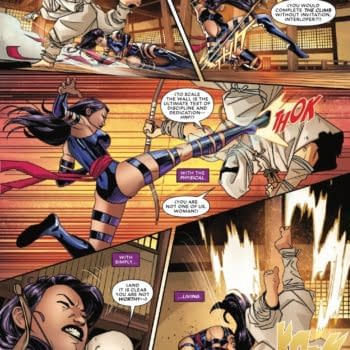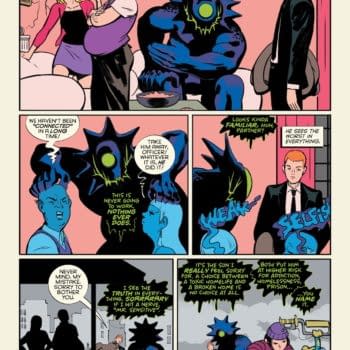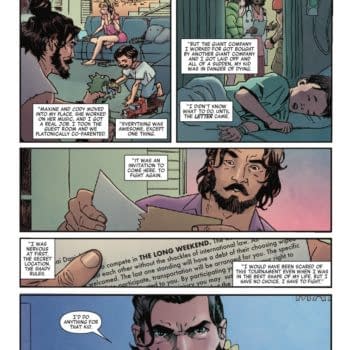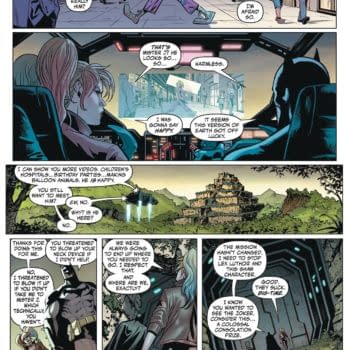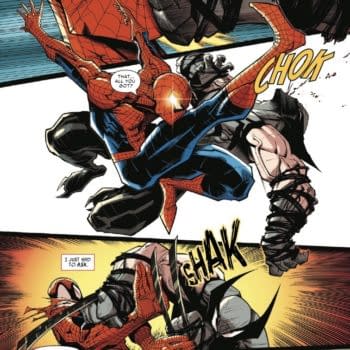Posted in: Comics | Tagged: Brandon Seifert, Comics, entertainment, Eric Battle, legendary comics, The Harvester
"Some People Believe In The Harvester The Same Way Some People Believe In Bigfoot" – Brandon Seifert On His New Project
Legendary Comics has a new series coming soon called The Harvester written by Brandon Seifert (Witch Doctor, Hellraiser). The Harvester follows two investigators who hunt down the urban legend of a vengeful superhuman enforcer. The cover art is by Eric Battle (X-Men, Green Lantern, Wonder Woman), and issue #1 of the 10-issue series launches February 11. I talked with Seifert about the series and what readers can expect.

BRANDON SEIFERT: The "Harvester" is this mysterious figure who's been reported appearing throughout the last 150 years or so, all over the world. Every alleged "sighting" of him has different details, but the broad strokes are the same. The "Harvester" shows up. He maims or kills somebody — or a bunch of somebodies! And then he leaves. He's inhumanly strong, and inhumanly tough. He never seems to age. Sometimes he's accompanied by another figure, a man in a grey suit who watches while the Harvester does his work. And, in some of the stories? The Harvester arrives by rising up out of the ground, and leaves by sinking into it the same way.
Some people believe in the Harvester. The same way some people believe in Bigfoot, or UFOs, or that Elvis is alive and still showing up places. But lots of other people think he's just an urban legend. And most people? They've just never heard of him.
But the Harvester is real. And what's we're exploring with the urban legend stuff is… okay, so what if vampires were actually real, and kept themselves generally a secret, enough so that most people think they're just made-up? There's no way they could stay totally secret. They'd leave a body count. Unsolved murders. Police reports. Newspaper articles. And sometimes there'd be witnesses, who'd tell stories about them. Eventually, you'd get an urban legend. That's exactly what's happened with the Harvester. He's stayed a secret… mostly.
BC: Now this story isn't necessarily about The Harvester, but rather about the two investigators who start to track down the story through history. Who are they and what drew them to the Harvester tale? And how do they go about tracking what he's done?
BS: The Harvester's definitely the protagonist of the series! But yeah, the characters we start discovering his legacy through are two people investigating the Harvester. Their names are Vicki Mills and Justin Luster. Vicki's a grad student studying urban legends. The stories and folklore surrounding the "Harvester sightings" are what she's doing her thesis on. On the other hand, Justin is a freelance investigative journalist… and a freelance private investigator, two! He's applying those overlapping skillsets to, basically, whoever's paying him in a given week. Vicki's looking at the Harvester through the stories people tell — but Justin's looking at the legends based on the physical evidence. Justin wants to get to the bottom of all the cold cases and stuff, to figure out what the truth behind the "Harvester killings" is. So, he recruits Vicki as basically a fresh perspective, someone to look at the problem from a different angle than he does.
Of course, they both have no idea that the Harvester is real, and is an authentic supernatural creature!
BC: So we've got our legend and our two investigators… but there is something more, right? Tell me about the sinister force of darkness that is uncovered and how it threatens our characters and everyone on Earth.
BS: Well, we don't get to that in the first issue. But the series does have a "Big Bad." The Harvester's this supernatural force. He gets his powers from something outside himself. And his powers are physical. Strength, durability, apparent immortality, stuff like that. His enemy's basically his opposite. Scientific, not supernatural. Self-made, not made by some other force. And somebody with a super-brain, instead of a super-body. Basically, if the Harvester's Superman? Then this guy's his Lex Luthor.But what's really interesting to me about this guy is… Yeah, in a lot of ways, he's the opposite of the Harvester. But at the core, they're basically the same thing. The Harvester and this guy, they're both trying to change the world for the better. But to do that, they're both doing terrible things. Like, killing people. So what makes one of them a villain? And the other one a "hero?"
BC: As a writer myself, I am always curious where the ideas come from. How did the idea for this story come about? How long have you been working on it?
BS: The idea for the "Harvester" didn't start with me. Legendary Pictures' CEO Thomas Tull came up with it. Thomas is a multi-talented guy, and he also loves stuff like science fiction, fantasy — all the stuff you see in Legendary's movies, that's the kind of stuff Thomas is into. Thomas isn't just a fan of it all. He also comes up with his own story ideas. But he's super, super busy… you know, running this crazy huge production company and making movies! So one of the things he's been doing with Legendary Comics is, like, "teaming up" with comics writers to make projects he's come up with like "The Tower Chronicles" and "Shadow Walk" happen. "The Harvester" is another of the concepts he originated.
Back in spring 2012, Legendary's editor in chief Bob Schreck got in touch with me, to see if I was interested in developing the project with Thomas. So, it's been in progress for a long time!
BC: The art on the book is done by Eric Battle. What was it about Eric's art that made him the right choice to collaborate with? What is the process of working together like?
BS: Well, "The Harvester" has a bunch of different genre influences. I think a lot of people are expecting it to be a horror book, because it's got a supernatural element. But it isn't. It's kind of "horror flavored," like dark urban fantasy. And then there's kind of a "superhero" element. In the sense that the Harvester is this guy with superhuman powers who helps people and beats up bad guys. And then there's, like, a bit of a crime comics feel to it. And when Thomas was first thinking up the character, I know he was really influenced by the kinds of "strong, silent" heroes you see in Westerns, too.
The thing about Eric is, his art style. It's pretty much got elements of all those different genres in there! Eric's a guy who can do superhero books. He can do horror books. He can do fantasy. Or crime, Westerns. All that stuff. So, we've got this weird cross-genre book. And it's cross-genre, in pretty much the same way Eric's art is!
BC: Since you broke into comics in 2011, you've worked with a number of different publishers: Marvel, Robert Kirkman's Skybound imprint at Image, IDW, Boom. How's it been working with a company like Legendary Comics, which is branch of a film company rather than being a comics publisher in a more traditional sense?
BS: It's been great! I've really enjoyed working with Legendary. I mean, every company I've worked with, they've all been very, very different experiences. Doing a book like "Witch Doctor" at Skybound is obviously going to be really different from doing something like "Disney Kingdoms: Seekers of the Weird" at Marvel. Or "Doctor Who" at IDW. But working with Legendary. That's been wildly different from any other experience I've had in comics so far! I mean, they're a film company. That's what they focus on. But they're also really committed to making comics, good comics… only, they've got a film company's budget, and a film company's staff! It's really floored me the amount of support this project's gotten from Legendary, at every level. I broke into comics by self-publishing "Witch Doctor," before it got picked up by Skybound.
In self-publishing, anything involved with making a comic, you've got to do it yourself. With Legendary, I pretty much got to focus on crafting the story, and then turning it into scripts. It was almost 100% writing. Which is pretty much every writer's dream!









